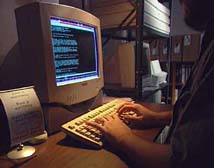Internet users in Germany will soon have a shockingly innovative way to access the Net
Published:
7 April 2001 y., Saturday
Internet users in Germany will soon have a shockingly innovative way to access the Net, when RWE Powerline rolls out Internet services over a small part of its power grid in July.
The technology is called Power Line Communications (PLC), and it could change the way many people get online. RWE Powerline is a subsidiary of RWE, Germany's largest electricity provider.
Right now we're the only company in the world doing this," said RWE Powerline spokesman Andreas Preuss. Passing data over electric wires is a relatively old idea, and many electric companies have already been using their networks to send data within their grids. Basically, data is transferred over high-tension wires just like electricity and then is stepped down and passed through a special transformer located at the local power substations.
Each transformer will be able to serve up to 200 households. From substation, data is conducted through low-tension wires into each home. A specially designed modem then interprets the data in a similar way to conventional modems. The modems, developed RWE's partner in the project, Swiss Ascom, can then be plugged into any electric socket in the house.
If RWE's program proves successful, the telephone companies -- which have been painfully slow in rolling out DSL across the continent -- could very well have some stiff competition on their hands.
Users will have to purchase a special modem for about $160 –- roughly the same price of a DSL modem -- and then pay a $23 monthly rate that will allow them to transfer 250 megabytes. Additional data transfer will cost 6 cents per megabyte.
Šaltinis:
wired.com
Copying, publishing, announcing any information from the News.lt portal without written permission of News.lt editorial office is prohibited.
The most popular articles
Software company announced new structure_ of it_s business.
more »
 A number of MEPs urged Internal Market Commissioner Michel Barnier to come up with common rules to regulate cross border online gambling in Europe.
more »
A number of MEPs urged Internal Market Commissioner Michel Barnier to come up with common rules to regulate cross border online gambling in Europe.
more »
 Think before you post as once you do it is online forever. That was the message on Safer Internet Day marked on 9 February by a seminar in the European Parliament.
more »
Think before you post as once you do it is online forever. That was the message on Safer Internet Day marked on 9 February by a seminar in the European Parliament.
more »
 50% of European teenagers give out personal information on the web – according to an EU study – which can remain online forever and can be seen by anybody.
more »
50% of European teenagers give out personal information on the web – according to an EU study – which can remain online forever and can be seen by anybody.
more »
 When did the Commission start working on social networking sites?
more »
When did the Commission start working on social networking sites?
more »
 ICSA Labs, an independent division of Verizon Business, is the first independent security-product testing and certification laboratory to earn ISO/IEC 17025 accreditation, validating the laboratory's world-class capabilities.
more »
ICSA Labs, an independent division of Verizon Business, is the first independent security-product testing and certification laboratory to earn ISO/IEC 17025 accreditation, validating the laboratory's world-class capabilities.
more »
 From today, European citizens, businesses and organisations can register .eu website names using characters from all 23 official languages of the European Union.
more »
From today, European citizens, businesses and organisations can register .eu website names using characters from all 23 official languages of the European Union.
more »
 Authorities investigated 301 mobile phone services websites in follow-up to EU crackdown on misleading consumer practices.
more »
Authorities investigated 301 mobile phone services websites in follow-up to EU crackdown on misleading consumer practices.
more »
 After nearly 2 years of legislative work the Telecom Package is due to be put to a final vote in Parliament on 24 November in Strasbourg.
more »
After nearly 2 years of legislative work the Telecom Package is due to be put to a final vote in Parliament on 24 November in Strasbourg.
more »
 The Christian Science Monitor reports that three men have been named as being the masterminds behind the hacking of RBS WorldPay, a subsidiary of the Royal Bank of Scotland.
more »
The Christian Science Monitor reports that three men have been named as being the masterminds behind the hacking of RBS WorldPay, a subsidiary of the Royal Bank of Scotland.
more »
 BAI’s Banking Strategies Insights reports that banks must get serious about improving their ATMs, especially in the area of envelope-free deposit.
more »
BAI’s Banking Strategies Insights reports that banks must get serious about improving their ATMs, especially in the area of envelope-free deposit.
more »